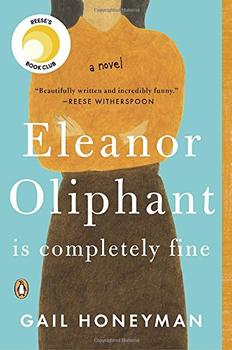Summary | Excerpt | Reading Guide | Reviews | Beyond the Book | Read-Alikes | Genres & Themes | Author Bio

This article relates to Eleanor Oliphant Is Completely Fine
In Eleanor Oliphant Is Completely Fine, the protagonist's lack of knowledge or understanding of social norms and conventions evokes sympathy, and leaves her lonely and isolated, at odds with the world. She expresses bafflement at many, and rightly so – they simply do not make sense. But social norms are not just cultural oddities and habits. They are powerful, can be both positive and negative – but are able to be changed. Governments and brands around the world are harnessing their potential for impact.
Nudge theory is a type of behavioral economics based on the idea that by creating situations and circumstances that make certain behavior and activity more attractive, individuals can be encouraged to change. In their 2008 book, Nudge – Improving Decisions about Health, Wealth and Happiness, Richard Thaler and Cass Sunstein state that patterns of action and behavior are better changed by improving the "choice architecture" surrounding it – the physical, psychological and social aspects that create the context in which people make choices. For example, having healthy food closer to the checkout makes it easier for individuals to choose those options.
Under the Obama administration the members of the Social and Behavioral Sciences Team at the White House were tasked with designing systems that helped alleviate some of the barriers individuals faced when engaging with social, political and economic issues. For example, implementing an "active choice" intervention, where individuals had a say in their pension contributions, helped increase retirement security. Reminder emails resulted in an almost 30% increase in student loan repayments. And paper wastage was reduced in companies by creating a pop-up message that would disappear if employees switched from single to double-sided printing.
Facilitating the creation of social norms is part of the World Health Organization's approach to challenging the practice of female genital mutilation in some African villages. According to WHO, a key factor leading to the abandonment of the practice was addressing collective rather than individual behaviours. Public condemnation and declarations against it were found to have significant symbolic value.
The Social Cognitive Networks Academic Research Center (SCNARC) at Rensselaer Polytechnic Institute analyzed vast quantities of data to identify the tipping point at which a marginal belief becomes the majority opinion. At least 10% of people have to hold an opinion for it to have any chance of being adopted more widely. One of their studies shows that a small group can create change – as long as they are committed and consistent in their belief.
Money talks. General Electric wanted its employees to stop smoking and researchers ran a trial offering cash incentives to quit. Quitting for six months earned you $250 and quitting for a year, $400. The treatment group had three times the success rate of the control. Rates of prolonged abstinence at 15 or 18 months in the incentive group remained significantly higher than those in the control group. Even within the incentive group however, the cessation rate at 15 or 18 months was just 9.4%, as compared with 3.6% in the control group, which shows that even financial incentives can't be enough to make a person quit smoking.
Social norms can change lives – for the better. It's all a case of understanding psychology and the environment in which we operate, our responses to it, and how small shifts can create big results.
Filed under Society and Politics
![]() This "beyond the book article" relates to Eleanor Oliphant Is Completely Fine. It originally ran in June 2017 and has been updated for the
June 2018 paperback edition.
Go to magazine.
This "beyond the book article" relates to Eleanor Oliphant Is Completely Fine. It originally ran in June 2017 and has been updated for the
June 2018 paperback edition.
Go to magazine.
The low brow and the high brow
Click Here to find out who said this, as well as discovering other famous literary quotes!
Your guide toexceptional books
BookBrowse seeks out and recommends the best in contemporary fiction and nonfiction—books that not only engage and entertain but also deepen our understanding of ourselves and the world around us.